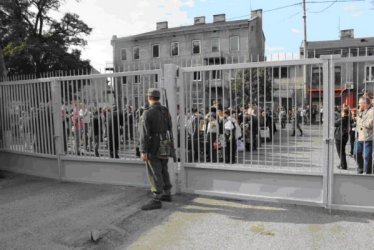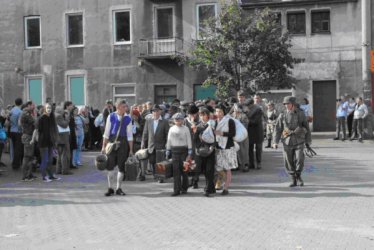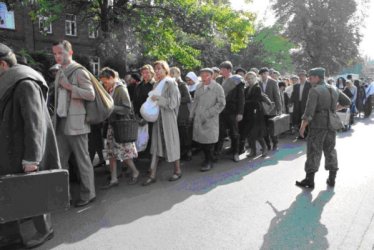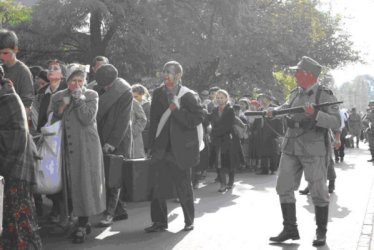



THE MARCH OF MEMORY - PRUSZKÓW - September 7, 2014
The Internet was my source of information about the March of Memory commemorating the fact of displacement of the civilians of Warsaw. The march had been organized by the District Authority Office and the Dulag 121 Museum in Pruszków as part of the commemoration of the 70th anniversary of the Warsaw Uprising. The solemnity had been under the auspices of the President of Poland Bronisław Komorowski.
For many years I have planned to visit the place where I had been staying for more than a week as a 2,5-year-old child, unconscious of dramatic moments experienced by Warsaw civilians after the Uprising. It was 70 years ago. My knowledge about the war and my family's post-war fate was totally based on my Mum's recollections. While listening to them, we could often feel tears in our eyes. In the Pruszków camp our grandmother Michalina Celejewska stayed with us, too. Eventually, all of us were lucky to survive.
Not surprisingly, I did want to participate in the March of Memory. Fortunately, I was offered to join my friends from the Association "Chrobry I" in Zduńska Wola, members of the reconstruction group, who were getting ready to come. Together we reached Pruszków by bus with reconstruction groups from the following towns: Jugów, Ludwikowice Kłodzkie, Wrocław, Zduńska Wola, Walichnowy and Mszczonów. More than 200 people from Warsaw and surrounding towns took part in the reconstruction.
Having been accommodated in one of Pruszków schools, we all went to the place of main events. It was my first collision with the past. It was emphasized by many-hour-long rehearsals that lasted till late evening and successfully introduced us to the climate of those past events. Mrs. Małgorzata Retkowska, an experienced director and a founder of the Group of Historic Reconstruction of Civilians, had prepared acting and the clothes from that époque.
It was not an easy task as within few hours we were to become deportees from Warsaw. The participants of this event were people of different age, both women and men, elderly ones, the youth and children. As for me, I was very affected by both preparations and the march itself. Although I didn't remember anything from those years, my knowledge had made my emotions immense.
The March of Memory set off on Sunday, September 7, at 9.30 a.m. Its route was from the former grade crossing in the 3 Maja street, through the former Main Gate, up to the lounge area number 5 nearby the Monument "Here Warsaw passed". Each participant felt this particular atmosphere and the tragedy of those years. It is hard to describe my emotional condition. To put it short, I was very touched. Most participants, like me, were affected by this experience. It seemed to us that we had made a move into that tragic time. We could feel that thanks to reliable acting, appropriate historic and logistic preparation, despite such a short period of time. First and foremost, our awareness of participating in such a historically important and tragic event for Warsaw civilians influenced us all.
The event was really professionally prepared. Clothing, like uniforms of German soldiers, seemed very realistic. The participants who played a role of civilians, were convincing, indeed. Everything was lifelike: children and women's screaming, moans of the wounded being repressed by harsh orders of German soldiers and their rifle butts, nuns giving aid for the tired, thirsty and elderly, a doctor trying to save human lives, a priest praying, confessing and giving the last anointment. And this uncertainty - what's going to happen with us?
I remember my Mum recalling her talks with my grandma, "... let it be whatever is going to happen. If only we were together". Such an atmosphere was experienced by me and other participants. We felt as if the past had came back. After all, we were taking part in an unusual and moving event followed by the solemn Holy Mass. It was offered nearby the Monument by the Warsaw Metropolitan Cardinal Kazimierz Nycz. After the Mass there was the appeal of memory and nominal Candles of Memory were lit. Afterwards, wreaths were laid underneath the Monument "Here Warsaw passed".
The March of Memory will undoubtedly stay forever in our minds. I am certain it was the unforgettable experience for numerous watchers who came to the Dulag 121 Museum at that Sunday forenoon of September 7, 2014. So was it for me. I am particularly happy I could personally participate in this so very important, also for me, event. I was one of supposedly three participants who passed this route from Warsaw to Pruszków as children 70 years ago. Neither then nor now, due to my age, was it an easy thing.
Apart from our participation as those who had experienced the war, the Uprising and the displacement, I particularly remember the words uttered by the Pruszków district head and the Dulag 121 Museum president, "I say thank you to everybody, especially the former prisoners of Dulag 121 and members of their families who had decided to participate in the March of Memory".
Also the words spoken by Małgorzata Retkowska, the reconstruction's director, moved me a lot, "I bend myself when I now stay in front of the people who had survived the hell of Dulag and decided to take part in the March, having defeated their own trauma from childhood."
written by Piotr Gałczyński - born in the year 1942 in Warsaw - Mokotów - now a resident of Zduńska Wola
compiled by: Maciej Janaszek-Seydlitz
translation: Monika Ałasa
Copyright © 2018 SPPW 1944. All rights reserved.